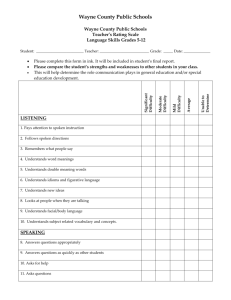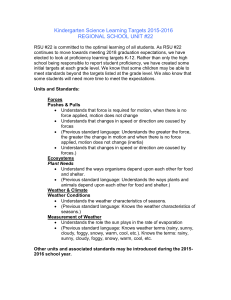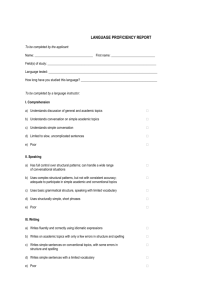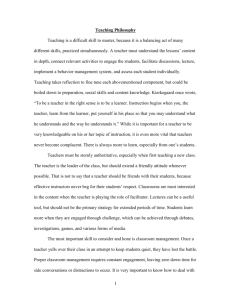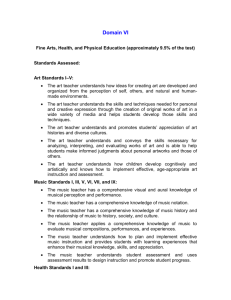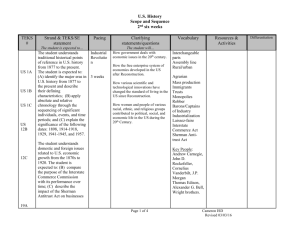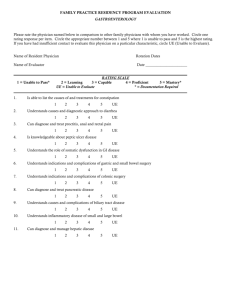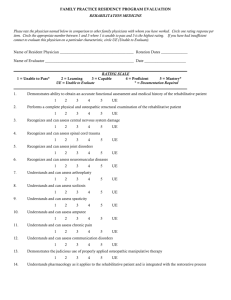11th Grade TAKS Vocabulary
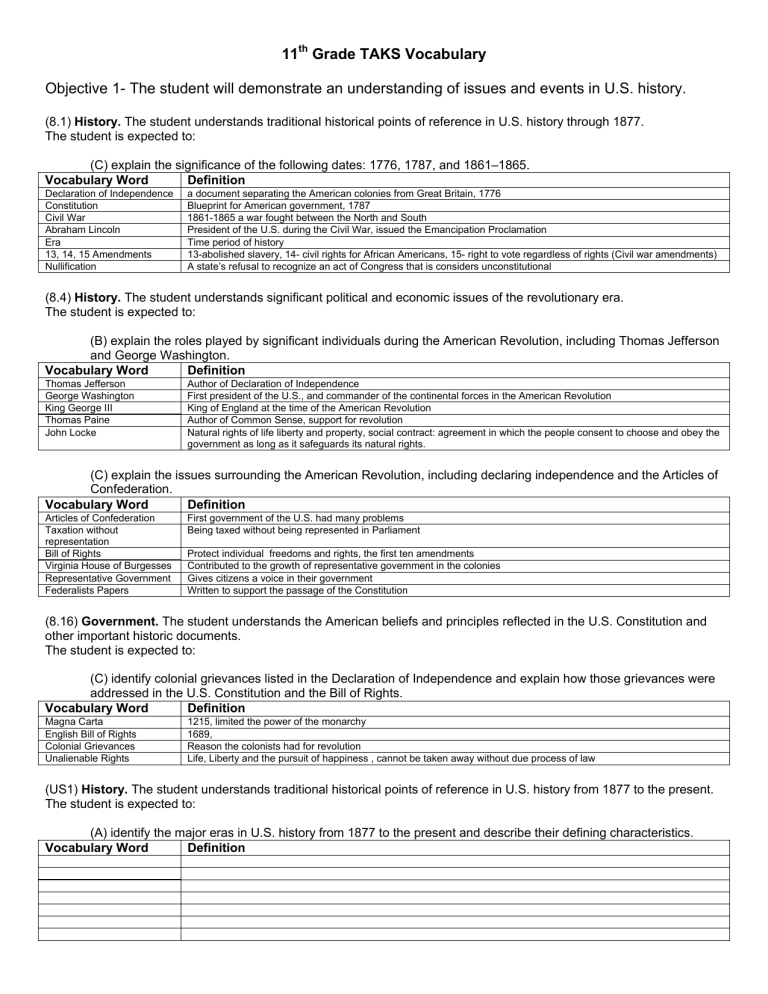
11
th
Grade TAKS Vocabulary
Objective 1- The student will demonstrate an understanding of issues and events in U.S. history.
(8.1) History. The student understands traditional historical points of reference in U.S. history through 1877.
The student is expected to:
(C) explain the significance of the following dates: 1776, 1787, and 1861–1865.
Vocabulary Word Definition
Declaration of Independence a document separating the American colonies from Great Britain, 1776
Constitution
Civil War
Abraham Lincoln
Era
13, 14, 15 Amendments
Nullification
Blueprint for American government, 1787
1861-1865 a war fought between the North and South
President of the U.S. during the Civil War, issued the Emancipation Proclamation
Time period of history
13-abolished slavery, 14- civil rights for African Americans, 15- right to vote regardless of rights (Civil war amendments)
A state’s refusal to recognize an act of Congress that is considers unconstitutional
(8.4) History. The student understands significant political and economic issues of the revolutionary era.
The student is expected to:
(B) explain the roles played by significant individuals during the American Revolution, including Thomas Jefferson and George Washington.
Vocabulary Word Definition
Thomas Jefferson
George Washington
King George III
Thomas Paine
John Locke
Author of Declaration of Independence
First president of the U.S., and commander of the continental forces in the American Revolution
King of England at the time of the American Revolution
Author of Common Sense, support for revolution
Natural rights of life liberty and property, social contract: agreement in which the people consent to choose and obey the government as long as it safeguards its natural rights.
(C) explain the issues surrounding the American Revolution, including declaring independence and the Articles of
Confederation.
Vocabulary Word
Articles of Confederation
Definition
First government of the U.S. had many problems
Taxation without representation
Being taxed without being represented in Parliament
Bill of Rights Protect individual freedoms and rights, the first ten amendments
Virginia House of Burgesses Contributed to the growth of representative government in the colonies
Representative Government Gives citizens a voice in their government
Federalists Papers Written to support the passage of the Constitution
(8.16) Government. The student understands the American beliefs and principles reflected in the U.S. Constitution and other important historic documents.
The student is expected to:
(C) identify colonial grievances listed in the Declaration of Independence and explain how those grievances were addressed in the U.S. Constitution and the Bill of Rights.
Vocabulary Word
Magna Carta
Definition
1215, limited the power of the monarchy
English Bill of Rights
Colonial Grievances
Unalienable Rights
1689,
Reason the colonists had for revolution
Life, Liberty and the pursuit of happiness , cannot be taken away without due process of law
(US1) History. The student understands traditional historical points of reference in U.S. history from 1877 to the present.
The student is expected to:
(A) identify the major eras in U.S. history from 1877 to the present and describe their defining characteristics.
Vocabulary Word Definition
(B) apply absolute and relative chronology through the sequencing of significant individuals, events, and time periods.
Vocabulary Word Definition
(C) explain the significance of the following dates: 1898, 1914–1918, 1929, 1941–1945.
Vocabulary Word Definition
(US3) History. The student understands the emergence of the United States as a world power between 1898 and 1920.
The student is expected to:
(A) explain why significant events and individuals, including the Spanish-American War, U.S. expansionism, and
Theodore Roosevelt, moved the United States into the position of a world power.
Vocabulary Word Definition
(B) identify the reasons for U.S. involvement in World War I, including unrestricted submarine warfare.
Vocabulary Word Definition
(D) analyze major issues raised by U.S. involvement in World War I, Wilson’s Fourteen Points, and the Treaty of
Versailles.
Vocabulary Word Definition
Nationalism
Isolationism
Treaty of Versailles
Militarism
Surplus
Fourteen Points
Pride in one’s country
Opposition to political and economic entanglements with other countries peace settlement that made Germany accept sole responsibility for World War I
The policy of building up an armed forces in aggressive preparedness for war and their use as a tool of diplomacy
An excess amount of product
The principles making up President Wilson plan for world peace following World War I
(US5) History. The student understands significant individuals, events, and issues of the 1920s.
The student is expected to:
(A) analyze causes and effects of significant issues such as immigration, the Red Scare, Prohibition, and the changing role of women.
Vocabulary Word Definition
Red scare
Emigrate
Saloon
Prohibition
The fear of communism taking over
Someone leaving a country to go to another country
A bar where illegal alcohol was served
A time period
(B) analyze the impact of significant individuals such as Clarence Darrow, William Jennings Bryan, Henry Ford, and Charles A. Lindbergh.
Vocabulary Word
Charles A. Lindbergh
Clarence Darrow
William Jennings Bryan
Henry Ford
Definition
First man to fly solo across the Atlantic Ocean
Tried and arrested for teaching evolution in Scopes Trial
Assisted the prosecution in the Scopes Trial, ran for President (democratic party), and deliverer the Cross of Gold
Speech (supported the coinage of silver)
Mass produced and marketed the Model; perfected the use of the assembly line
(US6) History. The student understands the impact of significant national and international decisions and conflicts from
World War II and the Cold War to the present on the United States.
The student is expected to:
(A) identify reasons for U.S. involvement in World War II, including the growth of dictatorships and the attack on
Pearl Harbor.
Vocabulary Word dictatorship
Definition
Government run completely by the power of one person
Propaganda Biased communication designed to influence people’s thoughts and actions
Hitler
Stalin
(B) analyze major issues and events of World War II such as fighting the war on multiple fronts, the internment of
Japanese-Americans, the Holocaust, the battle of Midway, the invasion of Normandy, and the development of and
Harry Truman’s decision to use the atomic bomb.
Vocabulary Word neutrality
Atomic bomb
Internment
Holocaust
Definition
Neither for or against a cause (to stay out of another country’s affairs
Dropped in Hiroshima and Nagasaki in August of 1945
Confinement of a group
The systematic murder (genocide) of Jews and other groups in Europe by the Nazis before and during WWII
(D) describe U.S. responses to Soviet aggression after World War II, including the Truman Doctrine, the Marshall
Plan, and the North Atlantic Treaty Organization.
Vocabulary Word
NATO
Warsaw Pact
Truman Doctrine
Marshall Plan
Definition
North Atlantic Treaty Organization; peace keeping organization formed by the Allied Powers after WWII
A military alliance formed in 1955 by the Soviet Union and its Eastern Europe satellites
A U.S. policy providing economic and military aid to free nations threatened by internal or external opponents
The program under which the U.S. supplied economic aid to European nations to help them rebuild after WWII
(E) analyze the conflicts in Korea and Vietnam and describe their domestic and international effects .
Vocabulary Word
Communism
Domino theory
Definition
Economic and political system based on one-party government and state ownership of property
The idea that if a nation falls under communist control, nearby nations will also fall under communist control
(F) describe the impact of the GI Bill, McCarthyism, and Sputnik I.
Vocabulary Word
GI Bill
McCarthyism
Spunik
Definition
Serviceman’s Readjustment Act: provided financial and educational benefits for WWII veterans
Attacks on people suspected of being communist by Senator Joseph McCarthy
Russian satellite that sparked the space race and encouraged education reform in the US
Objective 2- The student will demonstrate an understanding of geographic influences on historical issues and events.
(US8) Geography. The student uses geographic tools to collect, analyze, and interpret data.
The student is expected to:
(B) answer questions about geographic distributions and patterns shown on maps, graphs, charts, and models.
Vocabulary Word Definition
(US9) Geography. The student understands the impact of geographic factors on major events.
The student is expected to:
(A) analyze the effects of physical and human geographic factors on major events including the building of the
Panama Canal.
Vocabulary Word Definition
(US10) Geography. The student understands the effects of migration and immigration on American society. The student is expected to:
(A) analyze the effects of changing demographic patterns resulting from migration within the United States.
Vocabulary Word Definition
(B) analyze the effects of changing demographic patterns resulting from immigration to the United States.
Vocabulary Word Definition
(US11) Geography. The student understands the relationship between population growth and modernization on the physical environment.
The student is expected to:
(A) identify the effects of population growth on the physical environment.
Vocabulary Word Definition
Modernization
Environment
Pollution
Urbanization
Population Density
Industrial Revolution mobility
Application of new technology
The natural surroundings of humans
The contamination of the natural environment
The growth of cities
The number of people in a set unit of space
Movement of production from the home to the factory
The ability to move freely within the country
(WG1) History. The student understands how geographic contexts (the geography of places in the past) and processes of spatial exchange (diffusion) influenced events in the past and helped to shape the present.
The student is expected to:
(A) analyze the effects of physical and human geographic patterns and processes on events in the past.
Vocabulary Word Definition
(B) trace the spatial diffusion of a phenomenon and describe its effects on regions of contact such as the spread of bubonic plague, the diffusion and exchange of foods between the New and Old Worlds.
Vocabulary Word Definition
(WG6) Geography. The student understands the types and patterns of settlement, the factors that affect where people settle, and processes of settlement development over time.
The student is expected to:
(A) observe patterns in the size and distribution of cities using maps, graphics, and other information.
Vocabulary Word Definition
(WH23) Science, technology, and society. The student understands how major scientific and mathematical discoveries and technological innovations have affected societies throughout history.
The student is expected to:
(A) give examples of technological innovations that occurred at different periods in history and describe the changes produced by these discoveries and innovations.
Vocabulary Word Definition
Objective 3- The student will demonstrate an understanding of economic and social influences on historical issues and events.
(US2) History. The student understands the political, economic, and social changes in the United States from 1877 to
1898.
The student is expected to:
(B) analyze economic issues such as industrialization, the growth of railroads, the growth of labor unions, farm issues, and the rise of big business.
Vocabulary Word Definition
Progressivism
Labor Unions
Horizontal Integration
Liberal reform movement; 1900-1916
Worker’s organizations that band together for collective bargaining
Merging of companies that produce and sell the same products
The Grange Farmer’s alliances
(C) analyze social issues such as the treatment of minorities, child labor, growth of cities, and problems of immigrants.
Vocabulary Word
Exploitation
Urbanization
Segregation
Immigration
Migration
Definition
Profiting off of someone else’s labor
Growth of cities
The division of cities into ethnic neighborhoods
Moving from country to country
Moving within the same country
(US4) History. The student understands the effects of reform and third party movements on American society. The student is expected to:
(B) evaluate the impact of reform leaders such as Susan B. Anthony and W.E.B. DuBois on American society.
Vocabulary Word
Suffrage
Definition
The right to vote
Great Migration
NAACP
Plessy v Ferguson
Women’s Christian
Temperance Union
Seneca Falls Convention
The movement of African Americans from the rural south to the industrial north for work
National Association for the Advancement of Colored People; civil rights organization
Separate but equal is Constitutional; segregation is legal
Organization leading the fight for prohibition
First nationwide women’s rights movement
(US7) History. The student understands the impact of the American civil rights movement.
The student is expected to:
(B) identify significant leaders of the civil rights movement, including Martin Luther King, Jr.
Vocabulary Word Definition
Martin L. King Jr.
Jackie Robinson
Malcolm X
W.E.B. DuBois
Booker T. Washington
Cesar Chavez
Rosa Parks
Civil rights leader and spokesman; Southern Christian Leadership Council;
First African American Major League Baseball player
Popularized African American Islam movement
Founder of NAACP; promoted African American education
Promoted economic equality in order to achieve political economy
Formed the United Farm Workers Association; advocate of civil rights for Hispanic workers
Refused to give up her bus seat in Alabama to a white man; ignited civil right’s movement
(US13) Economics. The student understands significant economic developments between World War I and World War II.
The student is expected to:
(A) analyze causes of economic growth and prosperity in the 1920s.
Vocabulary Word Definition
Second Industrial Revolution Driving the economy toward consumerism
Buying on Credit
Investment
Stock Market
Bear Market
Bull Market
Purchasing goods with loans
Putting money into a business via stocks
The place where shares of companies are bought and sold
The stock market is down
The stock market is up
(B) analyze the causes of the Great Depression, including the decline in worldwide trade, the stock market crash, and bank failures.
Vocabulary Word
Black Tuesday
Definition
October 29, 1929; the crash of the stock market
Dust Bowl
Buying on Margin
Bank Run
Farm Crisis
Area of drought in the Midwest in the 1920’s and 1930’s
Pay a percentage of stock price and pay the rest if stock value goes down
Account holders withdraw all funds at one time forcing bank to default and close
Overproduction and low prices of crops worldwide
(C) analyze the effects of the Great Depression on the U.S. economy and government.
Vocabulary Word
Unemployment
Definition
Lack of a job
Public works projects
Hoovervilles
Keynesian Economics
Deficit Spending
Government projects providing jobs to the unemployed
Shantytowns populated by the unemployed
Priming the economic pump through the use of tax cuts and deficit spending
Spending more than is brought in by tax
(E) analyze how various New Deal agencies and programs such as the Federal Deposit Insurance Corporation and Social Security continue to affect the lives of U.S. citizens.
Vocabulary Word
FDIC
Definition
Guarantees deposits in Federal Reserve Banks up to $100,000
TVA
Unemployment insurance
Social Security
SEC
Built damns throughout the Tennessee River Valley
Money guaranteed to workers who are out of a job for a limited time
Determined income for peoples over the age of 65
Forces businesses to fully disclose information on their stock offerings
(US14) Economics. The student understands the economic effects of World War II, the Cold War, and increased worldwide competition on contemporary society.
The student is expected to:
(A) describe the economic effects of World War II on the home front, including rationing, female employment, and the end of the Great Depression.
Vocabulary Word
War Productions Board
Rosie the riveter
Definition
Set production priorities for wartime America
Symbol of women entering blue collar jobs during WWII
Rationing
War Bonds
Internment Camps
Setting fixed allotments on goods essential to the military
Way for the government to borrow money for the war effort
Forced relocation of Japanese Americans during WWII
(E) describe the dynamic relationship between U.S. international trade policies and the U.S. free enterprise system.
Vocabulary Word
Globalization
Definition
Opening of worldwide markets
NAFTA
Tariffs
Embargo
Quotas
Knocked down trade barriers between North American countries
Taxes on imports
Refusal to trade with a country
Agreed upon limitations between countries
(US21) Culture. The student understands how people from various groups, including racial, ethnic, and religious groups, adapt to life in the United States and contributes to our national identity.
The student is expected to:
(A) explain actions taken by people from racial, ethnic, and religious groups to expand economic opportunities and political rights in American society.
Vocabulary Word
15 th
Amendment
Definition
Suffrage for ex-male slaves
Boycott
General Strike
Refusing to do business with someone for political or social reasons
Strike held for political purposes
(D) identify the political, social, and economic contributions of women to American society.
Vocabulary Word Definition
NOW
Eleanor Roosevelt
Betty Friedan
Gloria Steinam
Francis Perkins
Sandra Day O’Conner
National Organization of Women
First lady during the Great Depression
Wrote the Feminine Mystique
Advocate for women’s rights
First female cabinet member
1 st
woman on Supreme Court
(US22) Science, technology, and society. The student understands the impact of science and technology on the economic development of the United States.
The student is expected to:
(A) explain the effects of scientific discoveries and technological innovations such as electric power, the telegraph and telephone, petroleum-based products, medical vaccinations, and computers on the development of the
United States.
Vocabulary Word
Bessemer Process
Definition
Technique used by injecting air into molten iron to remove the carbon & impurities creating lighter, flexible, rust resistant metal-steel.
Thomas Edison
Alexander Graham Bell
Edwin Drake
Jonas Salk incandescent light bulb, system for producing and distributing electrical power telephone
Successfully used a steam engine to drill for oil
Polio vaccination
(C) analyze the impact of technological innovations on the nature of work, the American labor movement, and businesses.
Vocabulary Word
American Federation of
Labor
Definition
AFL – focused on collective bargaining or negotiation between representatives of labor an management to reach written agreements on wages, hours, and working conditions.
Factories
Cyrus McCormick
Steamboat
Assembly line
John Deere
Eli Whitney
With the emergence of electricity, factories were operational 24hrs a day to increase production.
Inventor of reaping machine which allowed for quicker harvesting.
Increased transportation of people and goods
A manufacturing process in which interchangeable parts are added to a product in a sequential manner using optimally planned logistics.
Inventor of steel plow that could slice through heavy soil.
Inventor of the cotton gin which clean cotton rapidly and increased cotton production and slave labor.
(US23) Science, technology, and society. The student understands the influence of scientific discoveries and technological innovations on daily life in the United States.
The student is expected to:
(A) analyze how scientific discoveries and technological innovations, including those in transportation and communication, have changed the standard of living in the United States.
Vocabulary Word Definition
Transcontinental railroad
Mass transit
Rural Free Delivery
Henry Ford
Erie Canal railroads linking the east to the west increasing industries & business – iron, coal, steel, & glass
Transportation system designed to move large numbers of people – street cars, electric subways
RFD – system that brought packages directly to every home
Ford automobile – mass production by use of the assembly line
Linked Albany, New York to Lake Erie by technology and improved transportation by sending new products to markets across the United States.
Airplanes Wright brothers achieved 1 st
initial flight, opened markets for transportation of people and cargo.
(WG5) Geography. The student understands how political, economic, and social processes shape cultural patterns and characteristics in various places and regions.
The student is expected to:
(B) analyze political, economic, social, and demographic data to determine the level of development and standard of living in nations.
Vocabulary Word
Political Machines
Definition
Organized groups that controlled the activities of a political party for a city – helped immigrants with naturalization, housing, and jobs based on cultural ties.
Market Economy an economic system in which the production and distribution of goods and services take place through the mechanism of free markets .
(WG10) Economics. The student understands the distribution and characteristics of economic systems throughout the world.
The student is expected to:
(C) compare the ways people satisfy their basic needs through the production of goods and services such as subsistence agriculture versus market-oriented agriculture or cottage industries versus commercial industries.
Vocabulary Word
Market Revolution
Subsistence Farming
Definition
The increase of buying and selling of goods rather than make them for themselves.
The making/growing goods for one’s own use or consumption.
Objective 4- The student will demonstrate an understanding of political influences on historical issues and events.
(8.3) History. The student understands the foundations of representative government in the United States.
The student is expected to:
(A) explain the reasons for the growth of representative government and institutions during the colonial period.
Vocabulary Word democracy
Definition
Government directly by the people
Limited government
House of Burgesses
Individual Rights
Checks & balances, no one entity holds all the power
First representative body in colonial America
Rights guaranteed in the Bill of Rights- 1 st
amendment rights
(8.16) Government. The student understands the American beliefs and principles reflected in the U.S. Constitution and other important historic documents.
The student is expected to:
(A) identify the influence of ideas from historic documents including the Magna Carta, the English Bill of Rights, the Declaration of Independence, and the Federalist Papers, on the U.S. system of government.
Vocabulary Word
Magna Carta
Definition
Limits of King by guaranteeing jury trials and approval of taxes to nobles
English Bill of Rights Guarantees the right of English men – jury trial
Declaration of Independence Certain unalienable rights- life, liberty, & pursuit of happiness: government is responsible for ensuring these rights
Federalist papers Clearly stated arguments in favor of the Constitution
(D) analyze how the U.S. Constitution reflects the principles of limited government, republicanism, checks and balances, federalism, separation of powers, popular sovereignty, and individual rights.
Vocabulary Word
Representation
Checks & Balances
Definition the action or fact of one person standing for another so as to have the rights and obligations of the person represented
Democracy
Federalism
Popular Sovereignty
Republicanism
Separation of powers a system that allows each branch of a government to amend or veto acts of another branch so as to prevent any one branch from exerting too much power government by the people; especially : rule of the majority the distribution of power in an organization (as a government) between a central authority and the constituent units a doctrine in political theory that government is created by and subject to the will of the people
a government in which supreme power resides in a body of citizens entitled to vote and is exercised by elected officers and representatives responsible to them and governing according to law
Three branches of government
(8.17) Government. The student understands the process of changing the U.S. Constitution and the impact of amendments on American society.
The student is expected to:
(B) describe the impact of 19th-century amendments including the 13th, 14th, and 15th amendments on life in the
United States.
Vocabulary Word
13 th
14 th
15 th
Definition
Gave due process
Allowed to vote
(8.18) Government. The student understands the dynamic nature of the powers of the national government and state governments in a federal system.
The student is expected to:
Civil War secession
(B) describe historical conflicts arising over the issue of states’ rights, including the Nullification Crisis and the Civil
War.
Vocabulary Word nullification
Definition a state’s refusal to recognize an act of Congress that it considers unconstitutional.
War between the North and the South occurring from 1861-1865
The formal withdrawal of a state from the Union.
(8.20) Citizenship. The student understands the rights and responsibilities of citizens of the United States.
The student is expected to:
(A) define and give examples of unalienable rights.
Vocabulary Word unalienable
Life, liberty, and property
Life, liberty, and the pursuit of happiness.
Definition
A right that cannot be taken away by man or government.
The unalienable rights as defined by John Locke.
The unalienable rights as defined by Thomas Jefferson in the Declaration of Independence.
(B) summarize rights guaranteed in the Bill of Rights.
Vocabulary Word
First Amendment
Definition
Freedom of speech, religion, press, assembly, and petition.
Due process The government must act fairly and in accord with established laws in all that it does
Equal protection of the laws Equal protection means that the laws are to be applied to all persons in the same way.
(8.22) Citizenship. The student understands the importance of the expression of different points of view in a democratic society.
The student is expected to:
(B) describe the importance of free speech and press in a democratic society.
Vocabulary Word
First Amendment
Definition
Guarantees freedom of speech and the press which allows for different points of view
(US4) History. The student understands the effects of reform and third party movements on American society. The student is expected to:
(A) evaluate the impact of Progressive Era reforms including the passage of the 16th and 17th amendments.
Vocabulary Word Definition
Impact effect reform
Progressive Era
Political Machine
16 th
amendment
Income tax
17 th
amendment
Direct election
Pure Food and Drug Act
To change for the better
Time period when reformers tried to address the issues created during the Gilded Age a party organization, headed by a single boss or small autocratic group, that commands enough votes to maintain political and administrative control of a city, county, or state.
Creates federal income tax provisions
Tax based on a percentage of a person’s income
Provides for the direct election of US senators
Voters elect senators rather than the senators being chosen by state legislators
As a result of the publication of the Jungle, Teddy Roosevelt pushed through legislation to ensure safe food and drugs
(US7) History. The student understands the impact of the American civil rights movement.
The student is expected to:
(A) trace the historical development of the civil rights movement in the 18th, 19th, and 20th centuries, including the 13th, 14th, 15th amendments.
Definition Vocabulary Word
13 th
Amendment
Abolition
14 th
Amendment
Civil rights
15 th
Amendment suffrage
Jim Crow
Ended slavery in the United States to get rid of something; usually refers to the end of slavery in the United States
Granted due process, equal protection under the law, and citizenship to native born Americans
Laws passed to give rights to those historically discriminated against
Gave voting rights to all adult male citizens of the United States
The right to vote
The system of laws, particularly in the South, that legalized segregation and discrimination
(C) evaluate government efforts, including the Civil Rights Act of 1964 to achieve equality in the United States.
Vocabulary Word
Civil Rights Act of 1964
Accommodations
Definition
Outlawed discrimination in employment and accommodations based on race or gender
As used in this context, referred to hotels, restaurants, home sales and loans
(US17) Government. The student understands the impact of constitutional issues on American society in the 20th century.
The student is expected to:
(A) analyze the effects of 20th-century landmark U.S. Supreme Court decisions such as Brown v. Board of
Education .
Vocabulary Word
Segregate
Plessy v Ferguson
Brown v Board of Education
Desegregation
Definition
To separate, particularly racially
•
Supreme Court ruling in 1896 which held that states could segregate public facilities as long as all facilities were equal
• separate but equal was legal
•
Supreme Court ruling that overturned Plessy vs Ferguson
• separate schools cannot be equal and never would be because segregation implied inequality
To end segregated public facilities
(US18) Citizenship. The student understands efforts to expand the democratic process.
The student is expected to:
(B) evaluate various means of achieving equality of political rights, including the 19th, 24th, and 26th amendments.
Vocabulary Word
19 th
Amendment
Suffrage
24 th
Amendment
Poll tax
Primary election
26 th
Amendment
Definition
Gave voting rights to women
The right to vote
Eliminated the poll tax as a requirement to vote in primary elections for federal and state officials
Part of the Civil Rights legislation of 1964
A tax paid to allow a person to vote
Election held to determine the candidates in national election
Gave voting rights to all citizens 18 years old and above
Objective 5- The student will use critical thinking skills to analyze social studies information.
(US24) Social studies skills. The student applies critical-thinking skills to organize and use information acquired from a variety of sources including electronic technology.
The student is expected to:
(A) use primary and secondary sources to acquire information about the United States.
Vocabulary Word
Primary Source
Secondary source
Definition
An original document (or copy of an original document)
A source that cites an original source.
(B) analyze information by sequencing, categorizing, identifying cause-and-effect relationships, comparing, contrasting, finding the main idea, summarizing, making generalizations and drawing inferences and conclusions.
Vocabulary Word sequencing categorizing
Cause and effect comparing contrasting
Summarizing
Make generalizations inference
Definition
To place in order
To put in groups
To determine what caused something to happen
To find similarities
To find differences
Determine the most important points
Make a broad statement about something
A conclusion that is not stated directly
(C) explain and apply different methods that historians use to interpret the past, including the use of primary and secondary sources, points of view, frames of reference, and historical context.
Vocabulary Word Definition
Primary Source
Secondary source
Point of view
Frame of reference
Historical context
An original document or witness
A source that uses an original document or witness
Your perspective
Your point of view
Understanding the meaning of a word in the proper historical context; for example, in the the 1800s, abolition meant ending slavery.
(F) identify bias in written and visual material.
Vocabulary Word bias
Definition
To favor one side over another
(WG8) Geography. The student understands how people, places, and environments are connected and interdependent.
The student is expected to:
(B) compare ways that humans depend on, adapt to, and modify the physical environment using [local,] state, national, and international human activities in a variety of cultural and technological contexts.
Vocabulary Word Definition
(WG21) Social studies skills. The student applies critical-thinking skills to organize and use information acquired from a variety of sources including electronic technology.
The student is expected to:
(C) interpret maps to answer geographic questions, infer geographic relationships, and analyze geographic change.
Vocabulary Word Definition
(WH26) Social studies skills. The student communicates in written, oral, and visual forms.
The student is expected to:
(C) interpret visuals including graphs, charts, timelines, and maps.
Vocabulary Word Definition
